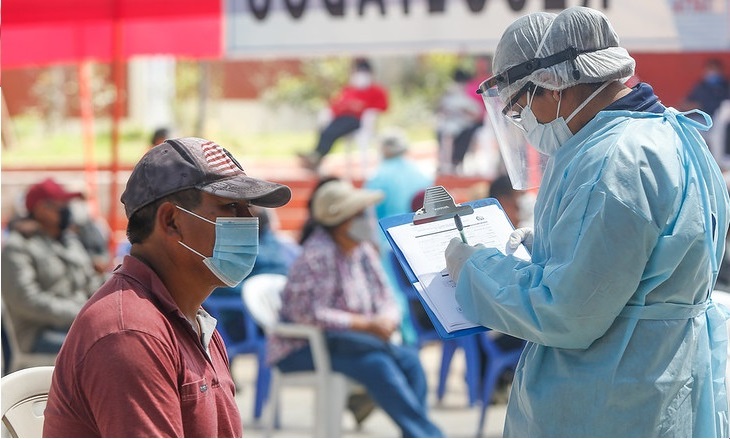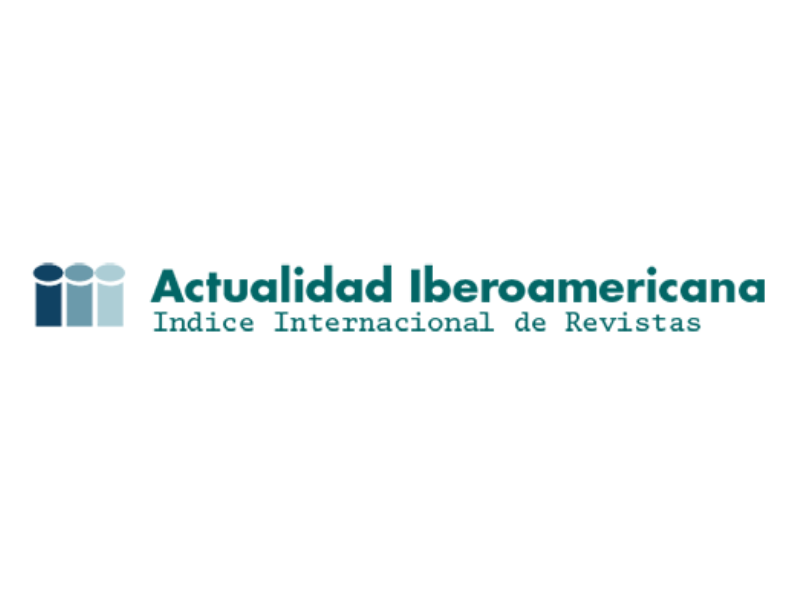Knowledge, attitudes and preventive practices regarding the second wave of COVID-19, La Libertad-Peru
Conocimientos, actitudes y prácticas preventivas frente a segunda ola del COVID-19, La Libertad- Perú


This work is licensed under a Creative Commons Attribution-NonCommercial-ShareAlike 4.0 International License.
Show authors biography
Objective. To analyze the knowledge, attitudes and preventive practices regarding the second wave of COVID-19 in residents of La Libertad, Peru. Materials and methods. A cross-sectional, correlational design was applied; a duly validated questionnaire was used and data were collected using a virtual form from 294 inhabitants of the department of La Libertad, whose sample was found to meet the required statistical parameters. Results. The characteristics of the respondents were average age of 28.3±9.9 years and 71.8% women. People with a good level of knowledge and an adequate attitude had characteristics such as married or cohabiting marital status, had children, a higher level of education and had stable work. The variables age and sex are those that were associated with the level of knowledge and attitude, as well as the fact of knowing the forms of contagion, which was significantly associated with the attitudes and preventive practices of the second wave of COVID-19 Finally, 38.1% of people surveyed indicated that they do not trust the effectiveness of the vaccine Conclusions. Residents presented good levels of knowledge, attitudes and preventive practices. However, it was noted that they are not clear about the ways of contagion. Added to the indifference towards vaccines and the economic crisis, this could have contributed to a significant increase in the number of cases.
Article visits 2062 | PDF visits
Downloads
- Cabezas C. Pandemia del COVID-19: tormentas y retos. Rev Peru Med Exp Salud Publica. 2020; 37(4):603-4. https://rpmesp.ins.gob.pe/rpmesp/article/view/6866/3976
- Solari L. El 2021 y sus nuevos retos en el control del SARS-CoV-2. Rev Peru Med Exp Salud Publica. 2021; 38(1):5-6. https://rpmesp.ins.gob.pe/rpmesp/article/view/7312/4130
- Ministerio de Salud del Perú [internet] Sala Situacional COVID 19 Perú. Lima: MINSA; 2021. [Citado el 22 de Mayo del 2021] Disponible en: https://covid19.minsa.gob.pe/sala_situacional.asp
- Carrascosa J, Morillas V, Bielsa I, Munera M. Cutaneous Manifestations in the Context of SARS-CoV-2Infection (COVID-19). Actas Dermosifiliogr. 2020; 111(9):734-42. https://doi.org/10.1016/j.adengl.2020.10.001
- Almubaid Z, Al-Mubaid H. Analysis and comparison of genetic variants and mutations of the novel coronavirus SARS-CoV-2. Gene Rep. 2021; 23:101064. https://doi.org/10.1016/j.genrep.2021.101064
- Pacheco J. La incógnita del coronavirus- Variantes y vacunas - La gestante y su niño. Rev Peru Ginecol Obstet. 2021; 67(1):1-10. https://doi.org/10.31403/rpgo.v67i2311
- Rzymski P, Zeyland J, Poniedziałek B, Małecka I, Wysocki J. The Perception and Attitudes toward COVID-19 Vaccines: A Cross-Sectional Study in Poland. Vaccines. 2021; 9(4):382. https://doi.org/10.3390/vaccines9040382
- Lehrer S, Rheinstein P. Eyeglasses Reduce Risk of COVID-19 Infection. In vivo. 2021; 35(3):1581-1582. https://doi.org/10.21873/invivo.12414
- Akhtar J, Garcia AL, Saenz L, Kuravi S, Shu F, Kota K. Can face masks offer protection from airborne sneeze and cough droplets in close-up, face-to-face human interactions?-A quantitative study. Phys Fluids. 2020; 32(12):127112. https://doi.org/10.1063/5.0035072
- Manterola C, Quiroz G, Salazar P, García N. Metodología de los tipos y diseños de estudio más frecuentemente utilizados en investigación clínica. Rev Med Clin Condes. 2019; 30(1):36-49. https://doi.org/10.1016/j.rmclc.2018.11.005
- Yupari I, Díaz J, Rodríguez A, Peralta A. Factores asociados a las actitudes y prácticas preventivas frente a la pandemia del COVID-19. Rev MVZ Córdoba. 2020; 25(3):e2052. https://doi.org/10.21897/rmvz.2052
- Bolivar E, Villanueva A. Validación y confiabilidad del Cuestionario AQ-27 de actitudes estigmatizadoras hacia pacientes con esquizofrenia en un Hospital General - 2015. Rev Neuropsiquiatr. 2017; 80(3):165-171. https://doi.org/10.20453/rnp.v80i3.3153
- Castro M. Bioestadística aplicada en investigación clínica: conceptos básicos. Rev Med Clin Condes. 2019; 30(1):50-65. https://doi.org/10.1016/j.rmclc.2018.12.002
- Riffenburgh R, Guillen D. Statistics in Medicine. 4th ed. London: Elsevier; 2020.
- Ruiz M, Diaz A, Ortiz M. Creencias, conocimientos y actitudes frente a la COVID-19 de pobladores adultos peruanos en cuarentena social Rev Cubana Enferm. 2020; 36:e4251. http://revenfermeria.sld.cu/index.php/enf/article/view/4251
- Ruiz-Aquino M, Díaz-Lazo A, Ubillús M, Aguí-Ortiz A, Rojas-Bravo V. Perception of knowledge and attitudes towards Covid-19 in a group of citizens from the urban Area of Huánuco. Rev Fac Med. Hum. 2021; 21(2):292-300. http://doi.org/10.25176/rfmh.v21i1.3352
- Bates BR, Tami A, Carvajal A, Grijalva MJ. Knowledge, attitudes, and practices towards COVID-19 among Venezuelans during the 2020 epidemic: An online cross-sectional survey. PLoS One. 2021; 16(4):e0249022. https://doi.org/10.1371/journal.pone.0249022
- Bates BR, Moncayo AL, Costales JA, Herrera-Cespedes CA, Grijalva MJ. Knowledge, Attitudes, and Practices Towards COVID-19 Among Ecuadorians During the Outbreak: An Online Cross-Sectional Survey. J Community Health. 2020; 45(6):1158-1167. https://doi.org/10.1007/s10900-020-00916-7
- Rios C. Conocimientos, actitudes y prácticas hacia COVID-19 en paraguayos el periodo de brote: una encuesta rápida en línea. Rev. salud publica Parag. 2020; 10(2):17-22. https://doi.org/10.18004/rspp.2020.diciembre.17
- Ngwewondo A, Nkengazong L, Ambe LA, Ebogo JT, Mba FM, Goni HO, et al. Knowledge, attitudes, practices of/towards COVID 19 preventive measures and symptoms: A cross-sectional study during the exponential rise of the outbreak in Cameroon. PLoS Negl Trop Dis. 2020; 14(9):e0008700. https://doi.org/10.1371/journal.pntd.0008700
- Sulistyawati S, Rokhmayanti R, Aji B, Wijayanti SPM, Hastuti SKW, Sukesi TW, et al. Knowledge, Attitudes, Practices and Information Needs During the COVID-19 Pandemic in Indonesia. Risk Manag Healthc Policy. 2021; 14:163-175. https://doi.org/10.2147/RMHP.S288579
- Ferdous MZ, Islam MS, Sikder MT, Mosaddek ASM, Zegarra-Valdivia JA, Gozal D. Knowledge, attitude, and practice regarding COVID-19 outbreak in Bangladesh: An online-based cross-sectional study. PLoS One. 2020; 15(10):e0239254. https://doi.org/10.1371/journal.pone.0239254
- Iqbal MA, Younas MZ. Public knowledge, attitudes, and practices towards COVID-19 in Pakistan: A cross-sectional study. Child Youth Serv Rev. 2021; 120:105784. https://doi.org/10.1016/j.childyouth.2020.105784
- Azlan AA, Hamzah MR, Sern TJ, Ayub SH, Mohamad E. Public knowledge, attitudes and practices towards COVID-19: A cross-sectional study in Malaysia. PLoS One. 2020; 15(5):e0233668. https://doi.org/10.1371/journal.pone.0233668
- Pignouli S. Escenarios sociales asociados con el brote de enfermedad por coronavirus (COVID-19). Astrolabio. 2020; 25:165-195. https://revistas.unc.edu.ar/index.php/astrolabio/article/view/29420
- Urrunaga-Pastor D, Bendezu-Quispe G, Herrera-Añazco P, Uyen-Cateriano A, Toro-Huamanchumo CJ, Rodriguez-Morales AJ, et al. Cross-sectional analysis of COVID-19 vaccine intention, perceptions and hesitancy across Latin America and the Caribbean. Travel Med Infect Dis. 2021; 41:102059. https://doi.org/10.1016/j.tmaid.2021.102059























